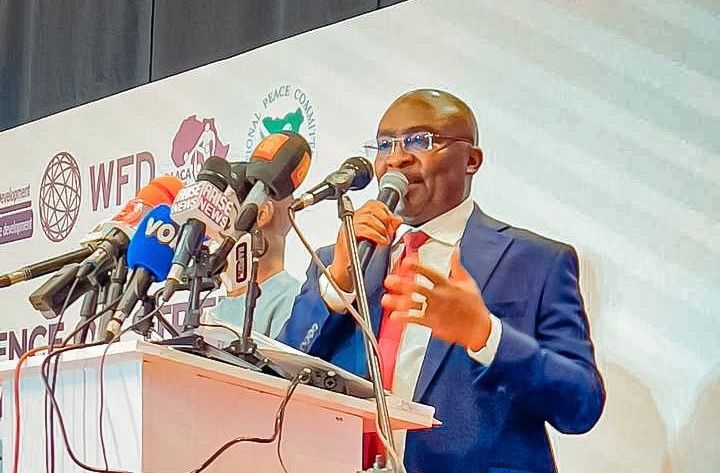Dr. Mahamudu Bawumia, the former Vice President of Ghana and the New Patriotic Party’s (NPP) flagbearer for the 2024 elections, delivered a crucial message to his party, urging them to steer clear of divisive narratives based on religion and tribal affiliations. He warned that such rhetoric posed a significant threat to the party’s unity and its prospects of regaining power. Speaking at the NPP’s National Chairmen Caucus Conference, Bawumia emphasized the dangers of attributing the party’s 2024 electoral defeat to his religious or ethnic background, underscoring the need for a unified front to move forward. He firmly asserted that such explanations were not only unfounded but also detrimental to the party’s cohesion and future success.
Bawumia’s call for unity comes in the wake of the NPP’s loss in the 2024 elections and subsequent internal discussions about the reasons behind the defeat. Some party members, including Member of Parliament Stephen Amoah, had suggested that Ghana might not be ready to elect a non-Christian president, implying that Bawumia’s Muslim faith might have been a factor in the loss. Bawumia directly addressed these claims, highlighting the significant number of votes he garnered – over 4.7 million – and questioning whether those votes could solely be attributed to Muslims or members of his ethnic group. He argued that such an assumption would be illogical and inaccurate, given the diverse nature of Ghana’s electorate.
The former Vice President’s emphasis on unity and rejection of divisive narratives demonstrates his commitment to building a stronger and more inclusive NPP. He stressed the importance of focusing on the real issues that contributed to the electoral defeat, rather than resorting to simplistic and potentially harmful explanations based on identity politics. By referencing various studies, including the Prof Ocquaye report, Bawumia reinforced his argument that religion and tribe were not determining factors in the 2024 election outcome. He urged the party to rely on evidence-based analysis rather than speculative narratives that could further fracture the party.
Bawumia’s appeal to unity resonates with the broader need for political discourse in Ghana to transcend identity-based divisions. Focusing on religion and ethnicity in political campaigns can often distract from substantive policy debates and hinder the development of inclusive governance. By emphasizing the importance of unity and discouraging divisive narratives, Bawumia sets a positive example for other political leaders and contributes to a more constructive political environment. His approach underscores the importance of focusing on shared national goals and building bridges across different communities within the country.
The NPP’s decision to schedule the next presidential primary for January 31, 2026, provides a clear timeline for the party to regroup and prepare for the 2028 general elections. Bawumia’s message serves as a critical reminder that the party’s success hinges on its ability to present a united front and address the concerns of all Ghanaians, regardless of their religious or ethnic backgrounds. By rejecting divisive narratives and focusing on substantive policy issues, the NPP can position itself as a viable alternative and work towards regaining the trust of the electorate.
In conclusion, Dr. Bawumia’s cautionary message to the NPP underscores the importance of unity and the dangers of resorting to divisive identity politics. His firm rejection of explanations that attribute the party’s electoral defeat to his religious or ethnic background sets a crucial precedent for political discourse in Ghana. By emphasizing the need for evidence-based analysis and a focus on shared national goals, Bawumia encourages a more inclusive and constructive political environment. As the NPP looks ahead to the 2028 elections, his call for unity serves as a vital reminder of the importance of building bridges across different communities and focusing on the real issues that affect the lives of all Ghanaians. This approach will be essential for the party to regain the trust of the electorate and present a viable path forward for the nation.


